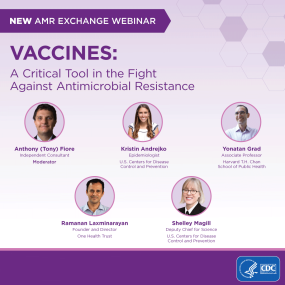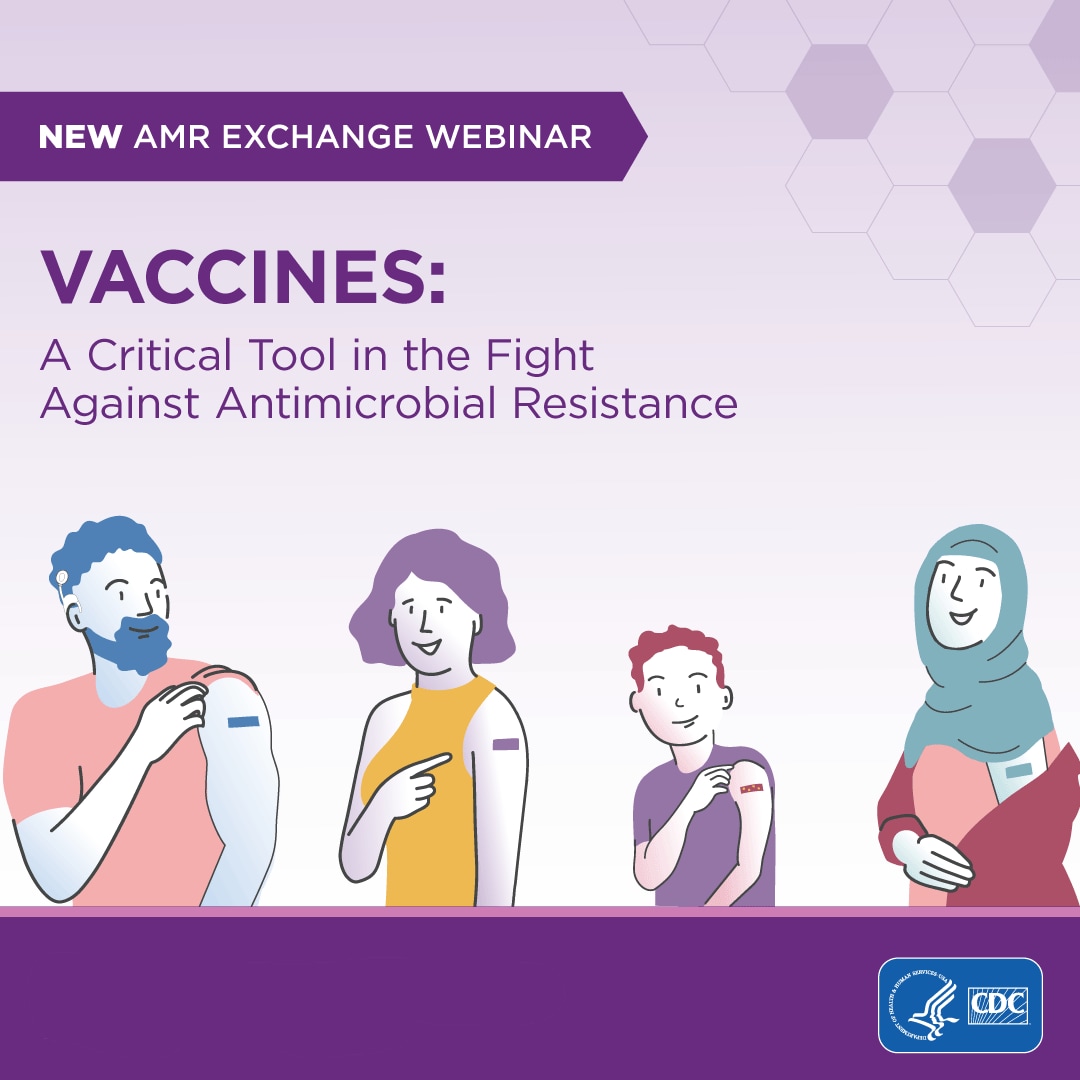Experts Discuss Role of Vaccines to Curb Antimicrobial Resistance
Posted On: December 2023
- During its seventh AMR Exchange webinar, CDC and experts discussed the role vaccines play in preventing infections and slowing the spread of antimicrobial resistance.
- The discussion focused on strategies—such as using and strengthening surveillance in communities to better understand the burden of healthcare-associated infections and antimicrobial-resistant pathogens—to inform vaccine development and use.
- Backed by rigorous data and science-driven communication, it is important to continue improving vaccine use and promoting open dialogue between public health, healthcare providers, and patients to increase vaccine uptake.
Antimicrobial resistance is an urgent global public health threat. Prevention tools, such as vaccines, can help stop infections from happening in the first place, therefore reducing the:
- Use or misuse of antibiotics and antifungals
- Infection duration or severity
- Transmission of antimicrobial-resistant pathogens
In the seventh installment of CDC’s AMR Exchange, CDC and experts sat down to discuss our shared commitment to pursuing innovative solutions and approaches to develop and deploy vaccines to help slow the emergence and spread of antimicrobial resistance domestically and abroad.
Kristin Andrejko, an epidemiologist in CDC’s National Center for Immunization and Respiratory Diseases discussed pneumococcal conjugate vaccines’ (PCVs) role in reducing illness and the burden of antimicrobial resistance. Andrejko underscored that PCVs are effective tools to slow the spread of antimicrobial resistance and reduce antibiotic use. Two new vaccines, PCV15 and PCV20, which protect people from 15 and 20 types of pneumococcal bacteria, have recently been recommended for use among children and adults and may reduce up to 700,000 antibiotic prescriptions for respiratory infections among U.S. children.

Yonatan Grad, Associate Professor of the Harvard T.H. Chan School of Public Health, highlighted a major part of his lab’s work on antimicrobial resistance in Neisseria gonorrhoeae (the bacteria that causes the sexually transmitted disease gonorrhea). Grad cited both the overuse of antibiotics and the availability of only one recommended treatment for gonorrhea, ceftriaxone, as contributing factors to the high burden of antimicrobial-resistant gonorrhea. Grad emphasized that vaccinations, new drugs, and improved stewardship are promising approaches to slow the spread of this highly prevalent infection. Grad also discussed the importance of increased monitoring and surveillance in clinical and public health settings and with disproportionately affected populations (such as younger adults whose rates of gonorrhea are highest) to better understand who is accessing and using antibiotics and to identify other potential drivers of antimicrobial-resistant gonorrhea.
Shelley Magill, Deputy Chief for Science in CDC’s Division of Healthcare Quality Promotion – Epidemiology, Research, and Innovations Branch, called on healthcare and public health professionals to maintain and streamline open channels of communication with patients when discussing vaccines. Magill, whose work focuses on conducting U.S. population-based surveillance and analyzing health information, highlighted how the COVID-19 pandemic reversed progress on antimicrobial resistance and infection prevention and control nationwide. Magill said the pandemic highlighted the need for increased prevention efforts, such as more vaccine uptake, to combat antimicrobial resistance. Magill also emphasized the importance of maximizing the use of existing vaccines until newer vaccines become available for use.
Ramanan Laxminarayan, founder and director of the One Health Trust, discussed the importance of global partnerships when combating antimicrobial resistance using vaccines. Laxminarayan noted that antimicrobial resistance anywhere is a potential threat everywhere and that what happens in one country is of consequence to other countries. Laxminarayan highlighted when countries are developing their antimicrobial resistance national action plans using a One Health approach, the plans should incorporate prevention strategies such as:
- Vaccination campaigns
- Clean water, sanitation, and hygiene infrastructure
- Antibiotic and antifungal stewardship efforts
- Infection prevention and control practices
Echoing Grad, Laxminarayan noted that increased understanding of behavioral science and the roles that patients, healthcare professionals, and communities play can also help inform strategies to reduce the burden of disease, promote appropriate antibiotic and antifungal use, and increase vaccine uptake.
The discussion highlighted the opportunity to capitalize on existing vaccines and advance development of new vaccines to slow the spread of disease. It is important for public health officials and healthcare professionals to continue to communicate accurate information and confront misinformation about vaccines. To help build vaccine confidence, public health officials and healthcare professionals need to work toward strengthening recognition of the intersection between vaccines and antimicrobial resistance and improving vaccine development and uptake.
Vaccines must be accessible, accepted, and supported by the public, partners, and policymakers to be effective in combating antimicrobial resistance.

Watch the recording of this AMR Exchange webinar to learn more about how CDC and its partners are addressing the role of vaccines to decrease the spread of antimicrobial resistance and the overall burden of disease globally.